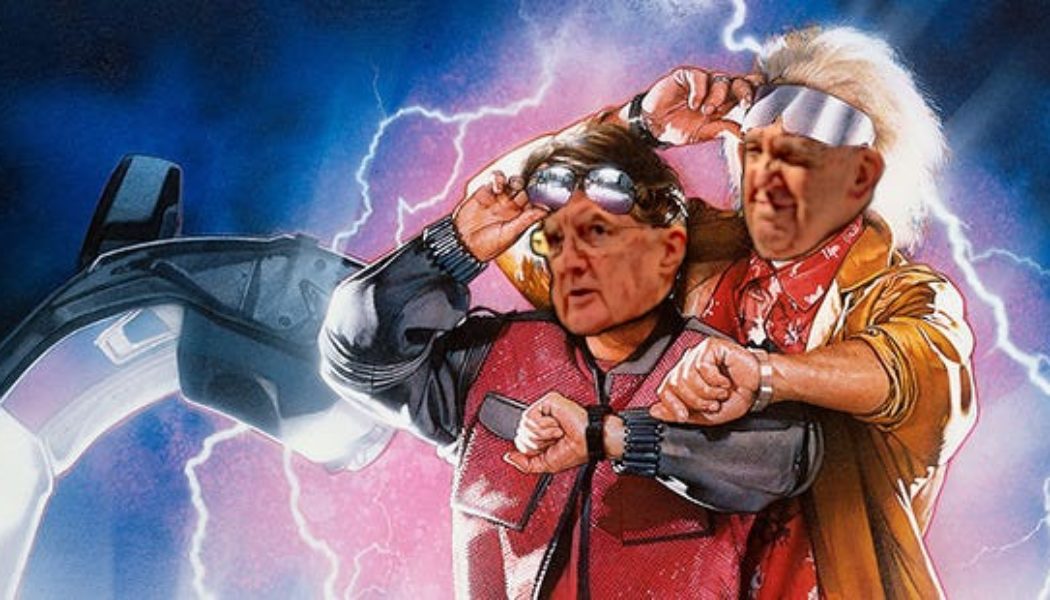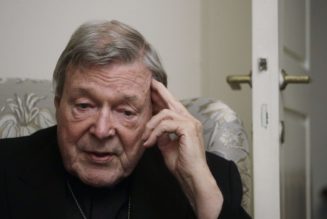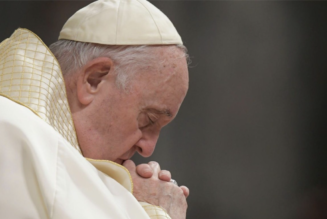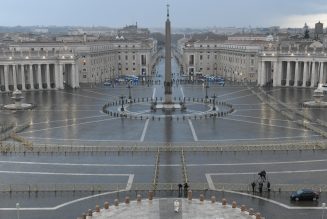Happy Friday friends,
As we are about round the corner into the second half of August, we’re entering what has previously been my favorite time of the summer for holiday-making.
The end of this month leading into and through the Labor Day holiday has long been the window in the calendar through which I try to slip for, if not a full-on vacation, at least a quiet change of scenery, now that I work from home.
It’s been fairly easy to manage — the usual spots tend to be under-subscribed as preparations ramp up for the new academic year and, long having had no children ourselves, my wife and I used to enjoy getting out of town just as everyone else is having to come back.
Not so this year. Our daughter, while happy and healthy, is so resolutely anti-social that we’ve decided to enroll her for a few mornings of Montessori a week at the local parish school, in the hopes that she’ll learn to accept, if not enjoy, the company of others.
This meant that my wife and I attended the new parents’ evening for the school this week, at which our calendar suddenly filled up with a surprising number of fairly important-ish looking events for the next few weeks. It wasn’t a total surprise. In fact, it was something to which we’ve been looking forward — we, no less than the child, need a bit of socializing.
Back to the parents’ evening: My wife and I were both deeply impressed with the principal’s presentation on the school, and its approach to building a life and community of faith. We’re lucky to have such a place to send our kid.
It was amusing, though. to see the different Pavlovian reactions my wife and I had to key phrases like “first bell,” “school supply list,” and “homework.”
My stomach reflexively tightened at the memory of semesters of missed assignments and acrimonious report cards — when we got home, I went through the files and found that records of my lack of “respect for authority” date back at least to 1989.
Meanwhile, in the seat next to me, my wife’s nostrils positively flared with enthusiasm as the principal waxed lyrical about parent-teacher conferences; compulsive overachiever that she is, such events were victory laps for her as a child.
It will be interesting to see which of us our daughter takes after. For my wife’s sake, I hope it’s her. In the meantime, my accidental failure to take (or provide) a summer vacation will be noted around the house at some point, I am sure.
—
The News
National security police in Hong Kong arrested 10 people yesterday, including a prominent local Catholic.
How, you might ask, was Yip supposedly colluding with foreign powers? By helping raise money for the 612 Humanitarian Relief Fund — a now-defunct non-profit set up to pay the legal fees of pro-democracy protestors in the wake of the 2019 demonstrations in Hong Kong.
If convicted, Yip could face life in prison.
If you are wondering, it is the same charge — and the same organization — which led to the arrest of Cardinal Joseph Zen last year. Yip now joins Zen on the long and growing list of Hong Kong Catholic leaders to be arrested on “national security” grounds, for which we can usefully read “pro-democracy advocacy.”
Read all about it here. And pray for Hong Kong.
—
A deadly wildfire tore through the historic Hawaiian town of Lahaina on the island of Maui this week, killing at least three dozen people and destroying hundreds of buildings.
The Pillar spoke with Msgr. Terrence Watanabe, pastor of the nearby parish of St. Anthony’s, about the situation on the ground, and what the local community needs now.
Here’s how he opened the conversation:
“Basically what we know is the fact that all of Lahaina Town has been consumed by fire. It’s all gone.
“It’s hard to try to reunite the families. Some people ended up in Central Maui… their home is in Lahaina, and they can’t get back there. They’re separated from their families. And communications are down – the cell phone towers were burned, and the landlines are not working.
“But we’re just very grateful. We’ve had so many calls from so many people – friends and family all over the mainland and all over the world, as well as from neighbor islands here in Hawaii.
“It’s just been incredible, the kind of concern and care of the community.”
You can pray for the people of Lahaina, and please do. And you can donate to the relief efforts being organized at St. Anthony’s here.
—
When people talk about “miracles” at World Youth Day, they are usually speaking metaphorically. But on the final day in Lisbon this year, a 16-year-old girl from Madrid said she had recovered her sight, after two years of almost total blindness.
Here’s what she said happened:
“After receiving Communion I went to the pew, and I started to cry a lot, because it was the last day of the novena and I wanted to be cured, and I had pleaded with God for this so many times.”
“When I opened my eyes, I could see perfectly.”
“I saw the altar, the tabernacle … my friends were there, and I could see perfectly that they were two-and-a-half years older than I remembered them, and later I looked at myself in the mirror. I am also a bit changed.”
—
Pope Francis made changes to the Code of Canon Law this week, tweaking the legal definition and description of personal prelatures. And since there is only one personal prelature in the Church, that means Opus Dei.
So, what do Francis’ latest legal amendments mean for Opus Dei in practice? And what is a personal prelature, anyway?
We have a full explainer for you right here.
Just be warned: this is JD’s specialist legal subject. He can nerd out on personal prelatures like I do about Freemasonry.
—
A Polish archbishop apologized on the Church’s behalf Monday “to all those who have been hurt by people” associated with a community led by a well-known exorcist.
What is interesting here is that the Mamre community is a private association of the faithful, not a public one. The canonical distinction can get a little… nuanced, but it is important. One of the key differences is that private associations don’t tend to act or perform their mission in the name of the Church, though the local bishop still has some oversight responsibilities.
—
Wednesday was the feast of St. Teresa Benedicta of the Cross, Edith Stein, an incredible saint about whom many people know a little.
But do you know about the saint’s niece, Eva Stein?
Born in 1915 in Germany, at the age of one, Eva was diagnosed with an intellectual disability. You can probably guess how things played out in Germany for a Jewish girl with an intellectual disability in the early 20th century.
But the relationship between Eva and her sainted aunt Edith has captivated Cristina Gangemi, an expert in intellectual and cognitive disability, with a particular focus on spirituality.
She spoke with The Pillar about Eva Stein, Edith Stein’s insights into the lives of people with disabilities, and why she thinks the saint may herself have been on the autistic spectrum.
Back to the Future
As dioceses across the United States continue to implement the norms of Traditionis custodes, Pope Francis’ 2021 motu proprio on what we used to call the extraordinary form of the Mass, something interesting is happening.
In some dioceses, bishops are designating non-parish churches for the stable use of communities who prefer the older form of the liturgy, communities which are often full of deeply devout Catholics who love the Church dearly.
In other dioceses, bishops are using the pope’s law to close down those communities, which is certainly their legal prerogative, and actually going far beyond Traditionis’ norms to regulate heavily even the celebration of the ordinary form of the Mass (that’s actually of questionable legality, but I digress).
The result, I’d argue, is less a kind of strange new reality for the Church here, and more a return to the situation of the 1980s, when Pope St. John Paul II issued similar norms on the liturgy to similar effects.
What I find especially interesting is that in the dioceses taking a harder line, cracking down on liturgy of all kinds, bishops seem hyper-concerned about liturgical preferences as a kind litmus test for doctrinal orthodoxy, specifically in relation to Vatican Council II — so far, so very ‘80s.
But many of those same bishops tend themselves to be on the opposite side of the debate from the Church’s teaching, including the Council’s, on a range of issues.
The result is, I think, groups of Catholics with sincere liturgical devotions but no doctrinal issues with the Council finding themselves squeezed in many dioceses — being told they are doctrinally suspect by Church leaders who themselves seem to be arguing for exactly the kind of breach between the lex orandi and lex credendi Pope Francis has warned Catholics against.
There are, of course, radical fringe figures who do think and argue publicly that the reformed liturgy is a manifestation of a wholly new theology, and that there is a rupture between the Church before the Council and what came after. They are, and let’s be clear here, wrong.
There is also something very different from the 1980s — a large contingent of American Catholic young people who discovered the extraordinary form during the Summorum days, who do not have that theological baggage, but who are looking for liturgy that is beautiful, and communities that treasure deeply the Christian faith.
But I wonder if some bishops saying, on the one hand, that the extraordinary form isn’t any longer an authentic expression of the faith, while on the other arguing for the ordination of women, the permissibility of divorce and remarriage, or the recognition of same-sex unions, isn’t fostering exactly the kind of post-conciliar skepticism they claim to want to stamp out.
I think the answer might also lie in the 1980s. Like Pope Francis, St. John Paul II issued some pretty tight restrictions on the celebration of the old Mass — including a ban on the use of parish churches.
But he also ordered the visitation of some doctrinally “out there” bishops, like Seattle’s Raymond Hunthausen, who used the “spirit of the Council” to argue for all manner of things contrary to Church teaching. And JPII was happy to see those bishops publicly corrected when necessary.
It seems to me that if we are now back in time to the liturgy wars of the 1980s, and if people are seriously worried about some kind of American schism, we need more help from Pope Francis.
The pope has warned about the essential link between the lex orandi and the lex credendi. Francis says he has acted to preserve the former, now we need him to help reinforce the latter. That, I think, is the lesson of history.
You can read my whole analysis here.
A day out
My week began with an 800-mile round trip to central Ohio. As JD generously shared the other week, I was earlier this month puller over in that section of Ohio, while driving home from my grandmother’s funeral. I was driving at what the state trooper and I agreed was a surprising rate of speed.
Without going into specifics, I was going fast enough that local laws required me to answer the charge in person, so I showed myself at the county court Monday morning at 9 a.m. and it was quite the day out.
I was one of several people up for arraignment that day, and we all sat on benches outside the courtroom, waiting for the judge to open proceedings.
I was, to give you a flavor of the crowd, not just the only person in a suit, but the only defendant who opted for trousers that morning. Everyone was, as you would expect, incredibly friendly — court officers and those with business before the bench alike. So conversation flowed freely around me.
Two men, I’d say in their early thirties, clearly knew each other socially but hadn’t met in a while, so they were using the occasion to catch up. One of them was sporting a new tattoo that covered the whole of his neck, and which I can only describe as resembling the WWF wrestling championship belt.
His acquaintance was asking if it hurt to get it done, to which he replied that the approved way to undergo tattooing of sensitive areas is to rub it down with an excessive amount of cannabis oil, rendering you physically and mentally numb.
Only the Adam’s apple hurt, he assured him.
A lady, whom I gathered was in for some kind of domestic incident, banged vigorously on the window of the public prosecutor’s office while we waited, demanding that he — whom she addressed by his first name — “get [his] ass out here ‘cause [they] gotta plead this shit down before the judge starts.”
Sitting next to me was a painfully polite young man in his middle twenties who asked me what I was in for. I told him, and he proceeded to warn me that the judge was a notoriously harsh sentencer for speeding, especially in excess of 100 mph. He was in for such an infraction himself, he told me, and expected to get 15 days in jail.
Without disclosing my own rate of speed, I can say that I blanched a little at this.
But it turned out it was this particular young man’s “third or maybe fourth” time being caught rocketing through the countryside of Erie County, and he expected judicial patience was running thin.
I asked him how he came to amass such an impressive record for speeding — was he a racer, or did he have a muscle car he was particularly fond of putting through its paces? No, he assured me, nothing like that.
“I just get caught getting to work and back, you know how it is.”
Given my circumstances, I supposed I did.
In the end, mine was the first case to be called. I acknowledged my rights, waived most of them, pled no contest, and apologized for my alleged actions — sincerely, by the way. I should not have been driving that fast.
The judge duly found me guilty, fined me less than I’d paid for gas and tolls driving up there, and sent me on my way.
I did, since you might be wondering, more or less scrupulously observe the speed limit on the six-hour drive home — even though I ended up having to outpace a tornado through Frederick County. Once bitten, twice shy.
And anyway, I doubt I could get my car to go that fast again without it exploding. One shouldn’t push one’s luck.
See you next week,
Ed. Condon
Editor
The Pillar
Comments 4
Services Marketplace – Listings, Bookings & Reviews











